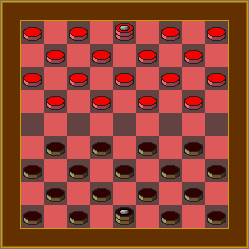

Philosophy Shogi Checkers was invented by Inoue Enryô, famous Japanese philosopher. The game was described by his student in 1890. It is similar to Anglo-Saxons checkers although it is played on a 9x9 board. Although capture is mandatory, it is not mandatory to capture the longest line (i.e. it is not necessary to choose the series of jumps that captures the most men). Philosophy Shogi Checkers is an attractive game; Anglo-Saxons checkers with a twist. It still revolves around acquiring material advantage, because the King cannot easily be attacked, unless it ventures out on the board in the middlegame.
The object is to capture the opponent’s King, or
stalemate the opponent so he has no moves. A Man can move
forward, by sliding diagonally to an adjacent empty square. It
may also jump over an enemy piece in any direction to a
vacant square on the other side. Jumping over a piece captures it.
Capturing is
mandatory, and you must keep jumping and capturing as long as it is possible.
When your Man reaches the other end of the board, it becomes a Prince and can
then move and capture forwards and backwards. It also
jumps to capture, but only one Man at a time. The King moves and captures like the Prince.
Philosophy Shogi Checkers never ends in a draw (except by repetition), because there is no “double corner” where the King can go back and forth. Thus all King vs. King endgames are won. By way of combinations one must try to attain material advantage, by exchanging one piece for two, or two for three, etc. In the endgame, material advantage generally leads to a win.
A good strategy is to try and get the first Prince, because this piece
will cause a lot of damage to the opponent, provided he cannot capture the Prince quickly. Try to hinder the opponent from getting a Prince, by
keeping your lines closed so that he cannot break through. The King, together with the guardians on the adjacent squares, should remain in place until a later phase of the game. Thus, both the King and the promotion squares are protected.
I suggest an improved version, named “Philosophy Checkers”, where the pieces may also capture orthogonally, as in Frisian draughts (here). This vouches for a much more combinatorial game. In this new variant, a Prince is a very powerful piece that can also slide orthogonally, but on the dark colour squares only. (Thus, it is the same piece as the Dame in Scandinavian draughts, here.)
Inoue Enryô (March 18, 1858 – June 6, 1919), Japanese philosopher, Buddhist reformer, educator, and nationalist; a key figure in the reception of Western philosophy, the emergence of modern Buddhism, and the permeation of the imperial ideology during the Meiji era. He is the founder of Toyo University and created the Temple Garden of Philosophy in Tokyo (cf. Wikipedia).
References
‘Philosophy Shogi Checkers’. Wikipedia article. (here)
‘Inoue Enryô’. Wikipedia article. (here)
☛ You can download my free Philosophy Shogi Checkers program here (updated 2020-10-22), but you must own the software Zillions of Games to be able to run it (I recommend the download version).
© Mats Winther, 2015.